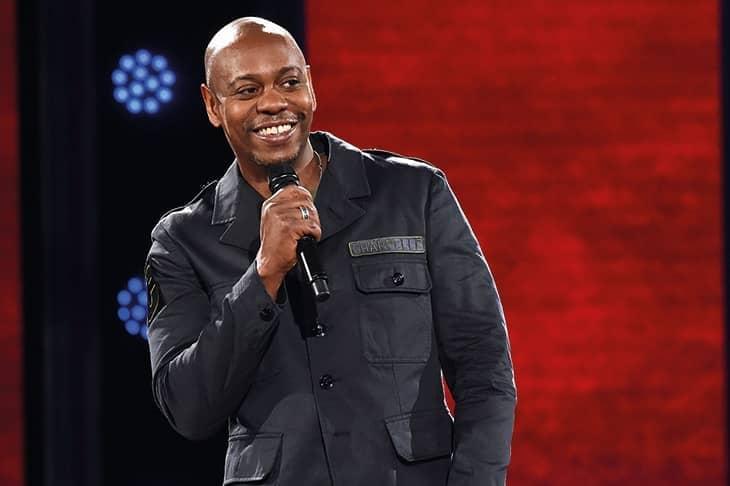I’m accustomed to a sense of urgency in relation to Netflix offerings because the streaming service often buys short-term rights that abruptly run out. But this time, I rushed to see Dave Chappelle’s new stand-up special The Closer lest Netflix’s own disgruntled employees succeed in getting the performance taken down. Strictly speaking, the affronted staff aren’t demanding the show’s withdrawal, but it’s hard to see what else the proposed employee walkout on Wednesday was designed to accomplish. After all, in the olden days if you didn’t like something on television you just didn’t watch it, but in our enlightened times you make damned sure no one else can watch it either.
Chappelle stoked the ire of trans activists with less than reverent jokes about gender swappers in his last Netflix show, Sticks & Stones. After being widely trashed as a ‘transphobe’, the comedian isn’t choosing to give such incendiary material a judicious wide berth, but in the new routine doubles down. In the interest of preserving his right to send up anyone he cares to, this is a sound stratagem: see, you can’t intimidate me. The show’s most transgressive lines — his calling surgically altered genitals ‘Impossible Pussy’, alluding to vegetarian fake meat — are also the funniest.
Where the performance sags is in its sincere bits. Particularly ill-judged is an over-long riff on a trans comedian who opened one of Chappelle’s acts, and who was subsequently lacerated on social media for supporting a notorious ‘transphobe’. Thereafter, Chappelle reveals dramatically, his colleague committed suicide. This is not funny, nor is it intended to be. The whole extended riff isn’t funny. Its purpose is to demonstrate that Chappelle cares deeply about trans people, that he knows and admires actual trans people, that he is not a transphobe.
In short, Chappelle sounds defensive, which has a lousy reputation for good reason. Defensiveness is a strategic mistake. It signals weakness. It betrays that your detractors got to you. And however weirdly, it also waves the red flag of guilt.
In an era of so much finger-pointing that the censorious will soon have to resort to making jabbing accusations with their toes, this is a commonplace quandary: when other people call you names and besmirch your reputation, how do you defend yourself without becoming fatally ‘defensive’? Whenever I denied having done something wrong as a kid, my father’s most exasperating rhetorical gambit was the misquotation of Hamlet: ‘Methinks thou dost protest too much.’ So I was guilty if I didn’t deny the misconduct, and guilty if I did deny it. Oh, swell. That’s why we have principles like ‘innocent until proven guilty’ — to counter the unfortunate fact that mere accusation imputes taint.
Thus the best way to convince the public that you’re a racist is to claim you’re not one — as Bright Sheng, a music professor at the University of Michigan, discovered last month. He’d shown his class a 1965 film of Laurence Olivier playing the role of Othello in blackface. Students were flamboyantly horrified and complained to the administration. Sheng apologized (error) and cited examples of his longstanding support for minorities — that is, he was defensive, an even bigger error, after which the professor was obliged to quit the class.
Many Spectator readers will be aware that your humble columnist here has been subject to more than one wholesale assault, in both social and legacy media. Reliably, something I’ve said or written has been maliciously, willfully misrepresented. I’ve experimented with defending myself — or, as I saw it, explaining myself (‘Look, did any of you people actually read the column?’) — and sure enough, that approach backfires.
What works better is aggressive counterattack, coming out with guns blazing. Alternatively, there are merits to a Gandhi-esque refusal to be drawn. When you blithely ignore all manner of slanderous huffing and puffing, it’s miraculous how fast the opposition exhausts itself and all that slung mud evaporates to dust.
So long as you can keep your job — quite a caveat at present — the very best response to being vilified is not to speak directly to outlandish accusations, but to carry on doing what you’ve been doing. To refuse to be waylaid.
In my case, that means continuing to express what I think, even if I’m courting more trouble. In Chappelle’s case, that should have meant putting together a routine that includes only the snarkiest, most outrageous gags about trans people, the bits that are genuinely, scandalously funny, and then moving on to other targets, about whom he could also be funny, which too much of his latest material isn’t. The failings of The Closer aren’t political but artistic. Having tempted the comedian to damage the quality of his act with all that pleading that deep down he’s really a nice person, his traducers score a win.
I’m a huge Dave Chappelle fan. He’s done more to advance American race relations than all the unconscious-bias training courses put together. So, Dave! A little free advice: you can’t please people who don’t wish to be pleased. Like, a while back, I was approaching a red light on my bike. An older woman had just started into the crosswalk, scowling with a bitterness that looked habitual. Her mouth was already open when I stopped. She’d been poised to shout at me for jumping the light, and my compliance with traffic laws ruined her good time. Furious, she sputtered desperately instead: ‘You’re supposed to stop at that white line, you know!’ I couldn’t help but laugh. As she didn’t wish to be pleased, pleasing her only intensified her displeasure. Like the rest of the woke brigade, most trans activists by nature do not wish to be pleased. Ergo, appeasement is pointless. So just keep doing what you’d been doing, friend.
Thus far, Netflix is sticking by The Closer. Professional critics may have been incensed, and I may have been disappointed, but the show maintains a 96 percent rating on Rotten Tomatoes. A thousand audience complaints are negligible among 10 million views. A blessed iron rule is holding: at least black comedians can still make jokes.
This article was originally published in The Spectator’s UK magazine. Subscribe to the World edition here.

























